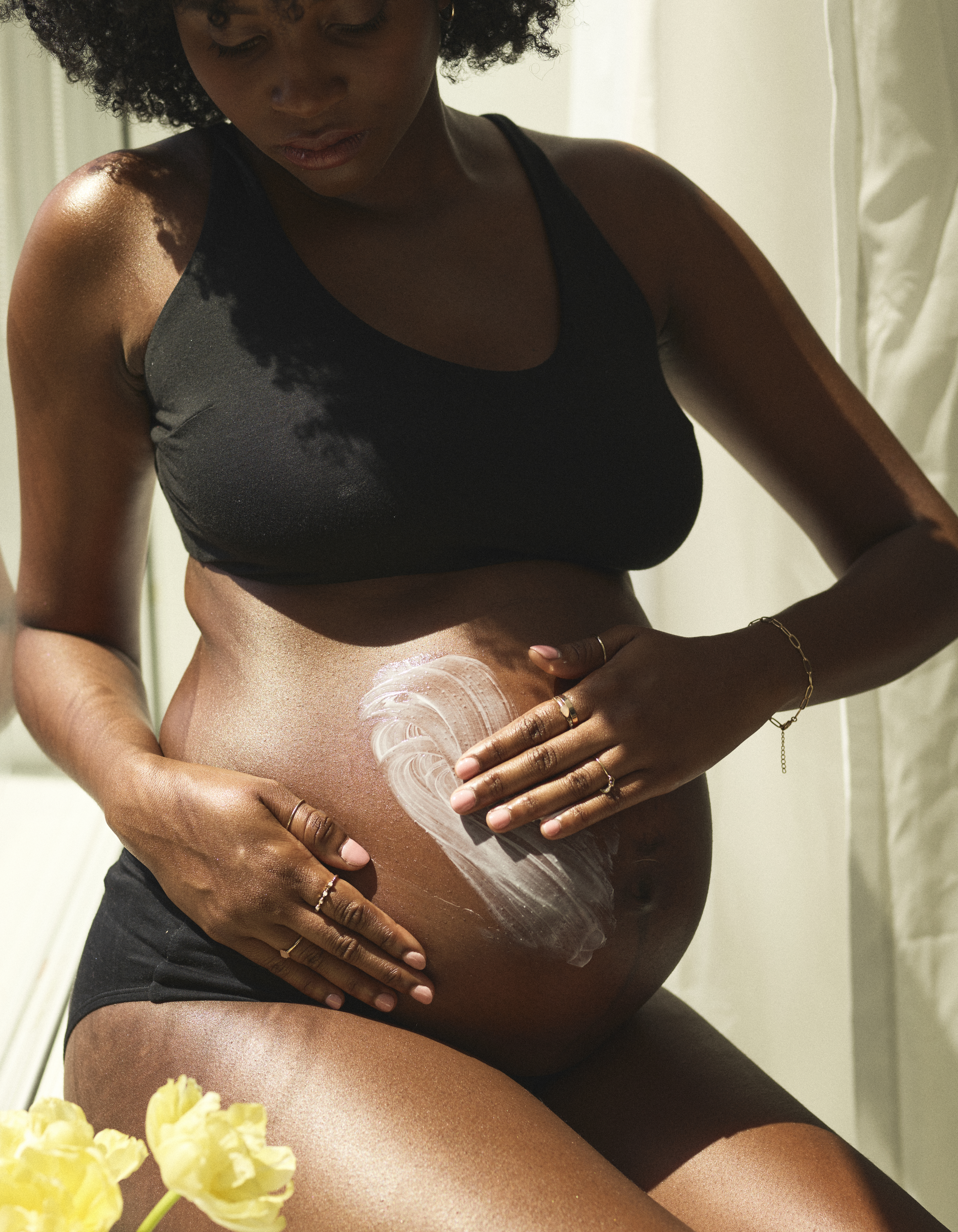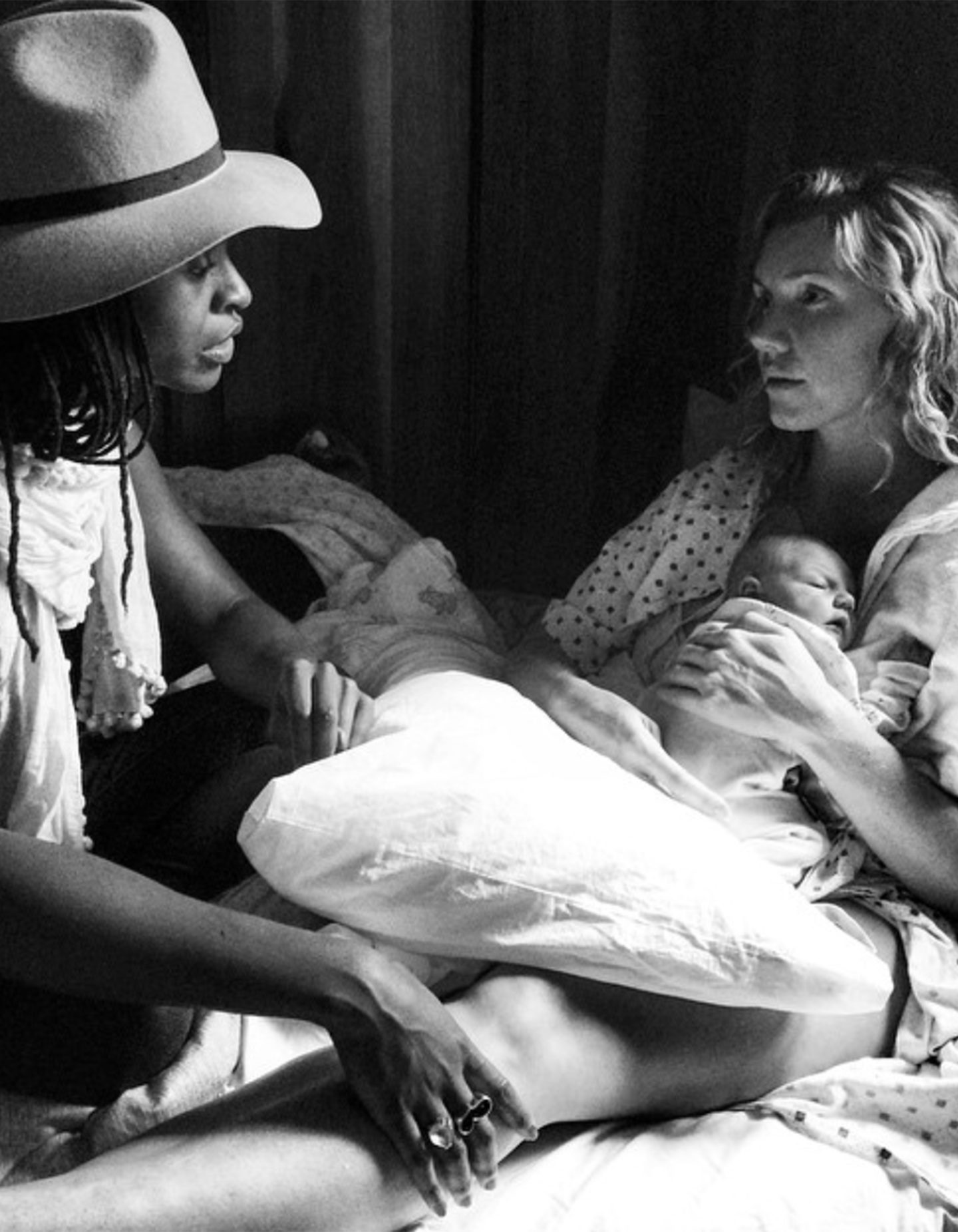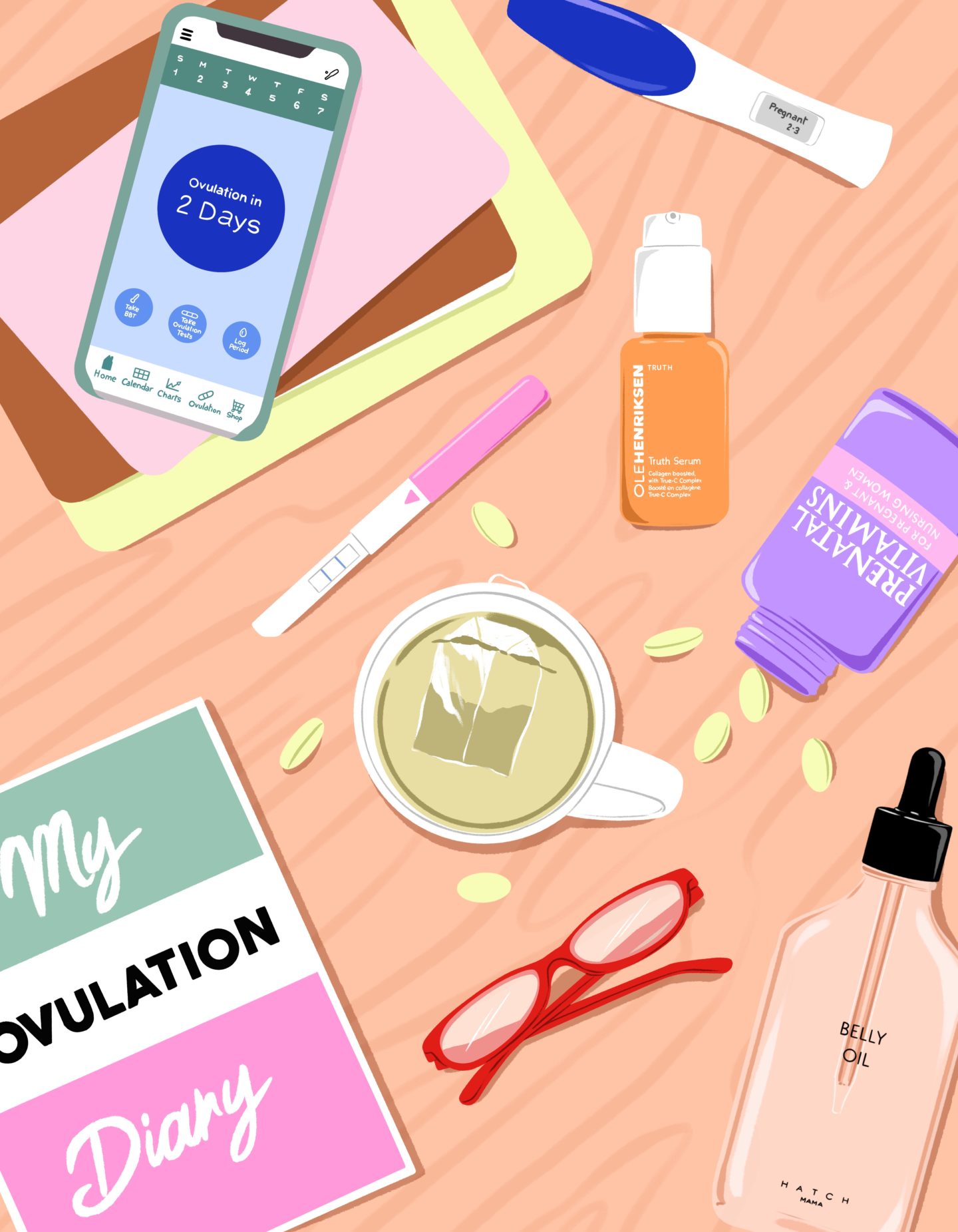Your skin’s going to do a lot of funky sh*t during pregnancy. Some good, some err…splotchy! If you’re experiencing sudden dark splotches all over your face, you’ve got the “mask of pregnancy,” or, according to a dermo, melasma. These spots will commonly show up on your forehead + cheeks and are the result of increased pigmentation. See, when you get pregnant, your body starts producing more hormones, which leads to more pigmentation. Don’t stress, nearly half of all pregnant women experience some sort of mask of pregnancy. To help prevent it, wear a really strong sunscreen (that’s mama + baby-safe, natch’) whenever you plan on being outside, as well as a sun hat. Fortunately, after pregnancy, your skin won’t be nearly as sensitive to the sun, though you should still practice good sun prevention anyway.
How do I prevent stretch marks?
We prefer the term “Warrior Marks” or “Mama Marks.” After all, if you have stretch marks from pregnancy, why not rock them with pride?! But we get it. Sometimes you’re just trying to maintain that youthful, supple pre-preggo bod. Is that so wrong?! Of course not. The bad news is that in large part, stretch marks are hereditary, so if your mama had them with you, odds are you’ll carry on that genetic code. But some defenses exist in tackling stretch marks along the way.
One of the best stretch mark strategies is making sure your skin maintains maximum elasticity. You can achieve this by eating Vitamin-rich foods that help form collagen. Vitamin C in particular helps protect tissue from damage, while Riboflavin and Niacin are known to promote healthy skin. Also, drink at least 2 liters of water a day to help strengthen and renew skin.
In tandem with eating well, our best-selling Belly Oil is a nutrient-rich quick-dry oil that helps relieve itching + reduces the appearance of stretch marks. Its baby-safe botanical blend is formulated to support skin as it stretches and provides deep hydration without leaving a greasy feel. It’s a one-two, power packed hydration from the inside out AND outside in.
Lastly, get moving! In addition to fighting fatigue, helping with sleep + reducing mood swings, working out improves circulation, which helps with skin elasticity and offers more stretch as it grows. Same goes with varicose veins! So hit up the pilates studio, the spin class, or go take a hike, literally.
What's up with heartburn?
Are you still feeling Taco Tuesday on Wednesday morning? Do you find that you can’t leave home without a roll of Tums? Don’t stress. Heartburn is a super common issue during pregnancy. It has nothing to do with the heart, so rest assured. But it does involve a yucky, burning-like feeling in the chest, which is highly uncomfortable and annoying. Heartburn happens when the valve between the stomach + esophagus can’t prevent stomach acid from coming back up into the esophagus. During pregnancy, the hormone progesterone causes the valve to relax, which can increase the frequency of heartburn. The stomach acid will then pass into the esophagus and irritate the lining. Heartburn + indigestion are more common during the third trimester when your expanding uterus starts putting pressure on the intestines.
Here’s what you can do to prevent heartburn. Eat smaller meals more often throughout the day, rather than a few large meals. Also avoid spicy, greasy food. If you’re having heartburn, try eating some yogurt or milk, as dairy can help calm the acid in your stomach. If your heartburn is severe, call your doc and she might prescribe some mama and baby-safe medication.
Why do I have excessive saliva?
It’s totally normal to have more saliva while you’re pregnant. It’s called ptyalism, or sialorrhea, and the condition won’t affect your baby.
Normally, your salivary glands produce about 1 1/2 quarts of saliva a day, but you don’t realize it because you swallow! If you suddenly seem to have a lot more saliva in your mouth now that you’re pregnant, you actually may be producing more or swallowing less – or a combination of the two. Your excessive saliva might be a result of hormonal changes, nausea (which causes more saliva production) or heartburn, since the acid in your stomach can irritate your esophagus and triggers your salivary glands to produce more.
Some hacks to producing less saliva include brushing your teeth + using mouthwash several times a day, eating small, well-balanced meals, drinking plenty of water and sucking on hard candy or chewing gum.
What's my Rh status and why does it matter?
The Rh factor is a protein found on the surface of red blood cells. Most people who have the Rh factor are Rh-positive. Those who do not have the Rh factor are Rh-negative. At some point in your early pregnancy, you will have blood tests to find out your blood type. When the mother is Rh-negative and the father is Rh-positive, the fetus can inherit the Rh factor from the father. This makes the fetus Rh-positive too.
This becomes an issue when the fetus’s blood has the Rh factor and the mother’s blood does not. If you are Rh-negative, and a small amount of the baby’s blood mixes with your blood, your body may create antibodies to the Rh antigens in the baby’s blood.
Not to worry mama. Thanks to modern medicine (yay!), you’ll undergo many tests to arm you with all the knowledge for your doctors to act accordingly. In addition to a basic blood test, an antibody screen can show if you’re RH negative and have developed antibodies to your RH positive babe. If so, an injection of Rh immunoglobulin (RhIg), a blood product can prevent this kind of reaction.
Why am I having such mood swings?
You’re bloated, you’re stressed + you’re shouldering ALL the burden of bringing new life into this world. One minute you’re full of unbridled joy, and the next minute you want to toss a chair at your partner. Welcome to mood swings, the highs and lows of pregnancy (and motherhood, if we’re being totally honest). While these swings can be attributed to the general stress of pregnancy, there’s a bit more going on beneath the surface. Beyond the physical and metabolic changes (plus fatigue), your estrogen + progesterone levels are running amok in your body, which can affect your neurotransmitters, aka the brain chemicals that regulate mood. As your hormones even out after 10 weeks, so too should your feelings. But, if you find that you just can’t get a hold on things, call your medical provider to discuss options in seeking support.
Why am I constipated?
Constipation is one of those rarely-discussed symptoms of pregnancy that affects just about everyone. It’s thought to be a result of hormones that relax the intestinal muscle + make food and waste move slower through the system, and by the pressure of a growing uterus on your intestines. Here are a few ways to reduce constipation:
- Eat A High Fiber Diet: We’re talking 25-30 grams per day. Fruits, veggies, bran, prunes. You know it.
- Drink Fluids, Lots of Them: 10-12 cups per day!
- Get Moving: Walk, swim and do anything moderately to keep everything flowing.
- Use Certain OTC Remedies: Metamucil is Category B and Colace, a stool softener, is also safe to use. Laxatives + Mineral Oil are pregnancy no-no’s.
Which cleaning products are safe to use?
Contrary to what you’ve heard, it IS safe to use cleaning products during pregnancy (wanting to clean, on the other hand….) Just remember to take a few precautions. First, make sure you have plenty of fresh air circulating where you’re working and wear gloves and a long-sleeved shirt to protect your body (chemicals can be absorbed through the skin).
There is one cleaning job you’ll ask your partner to do – your oven. Oven cleaners give off A LOT of fumes. Another no-no is aerosol cleaning products, which release breathable chemicals into the air. If any fumes make you feel sick, ask someone else to do the cleaning. (hey, you’ve got the ultimate excuse!)
Finally, regardless of whether you’re pregnant or not, it’s important to remember never to mix different chemicals, such as ammonia and bleach. Such a combination can be very dangerous to anyone inhaling it. You can make your own all-purpose, all-natural cleaner by mixing vegetable-based liquid soap with a few drops of lavender essential oil. You can also look for natural cleaning products free of harsh + toxic substances. White distilled vinegar makes a great natural cleaner, and baking soda can clean tough marks from ovens. If you don’t have time to DIY, you can always shop “green” cleaning products that contain natural, organic ingredients instead of chemicals.
Why do I have to pee so much?
That constant, unyielding “Holy Sh*T I gotta GO!” need to pee is one of the most common early symptoms of pregnancy that starts in the 1st trimester. For some mamas, this pressure, ahem, relieves itself once the uterus rises into your abdominal cavity during the 2nd trimester, although you may not notice that much relief. (Sorry.)
This whole pee “situation” is a result of the pregnancy hormone hCG, which increases the blood flow to your pelvic regions. While that blood flow can be linked to increased sexual pleasure (if you’re game for it, that is), it’s not so good for long car rides. HCG also increases blood flow to your kidneys, which become more efficient during pregnancy.
As your kidneys get better at their job, your body gets rid of waste quicker. Your expanding uterus is also to blame since it puts pressure on your bladder, giving it less room to store urine.
Just stay near a bathroom and you should be OK.
Of course, if you’re finding that your excessive need to pee is beyond excessive, phone your doc!
What are my chances of having twins?
Wondering if you might be housing two or more future besties? It may seem like everyone’s having twins these days, and it’s kind of true. The number of twin births has jumped more than 75% in the past 30 years. What’s behind this multiple-baby boom? The fact that we’re all having babies older has something to do with it, along with an increase in fertility treatments + rise in obesity. Yet these are only a few of the factors.
Here are some more:
- You have twins in your family: Your great uncles Eddie + Freddy might not be the only twins representing. Heredity doubles your chances of conceiving twins, but only on the mom’s side.
- You’ve had twins before: Watch out, mama! If you’ve already given birth to twins, you’re more likely to do it again.
- You’re an older mama-to-be: As you age, your chances of having twins goes up. Researchers have found that women over 35 produce more follicle stimulating hormone (FSH) than younger women, which may cause more than one egg to drop at ovulation.
- You’re undergoing fertility treatments: Having any kind of assisted reproduction (especially the kind that stimulates ovulation) multiplies your chances of twins. About one-third of twin births and three-fourths of triplet births (and quadruplet births, etc) can be attributed to fertility treatments, according to a study in the New England Journal of Medicine.
- You’re overweight. Women with pre-pregnancy BMIs higher than 30 are more likely to have fraternal twins than women with lower BMIs. Researchers think it’s because taller women have higher levels of insulin-like growth factor (IGF), which boosts ovulation by upping the sensitivity of the ovaries to FSH.






